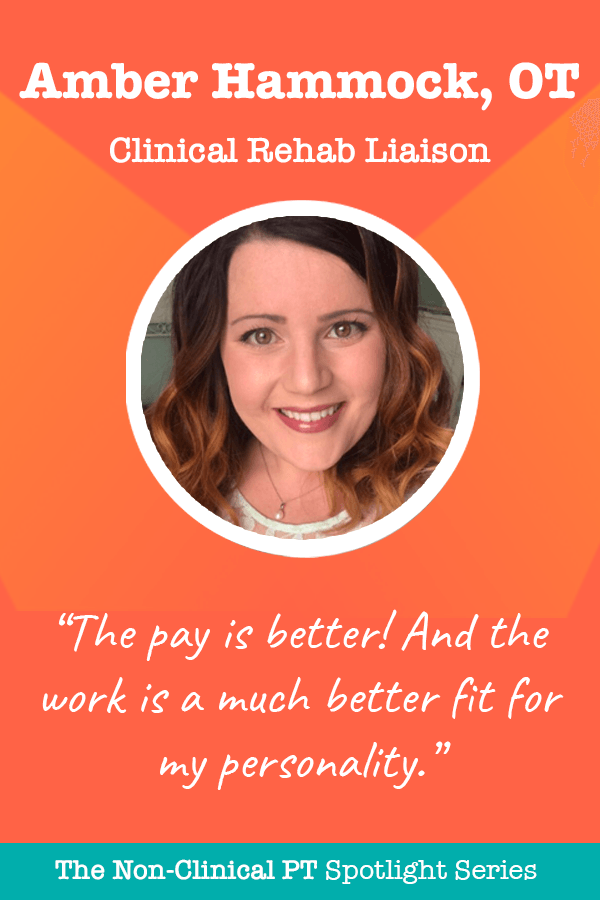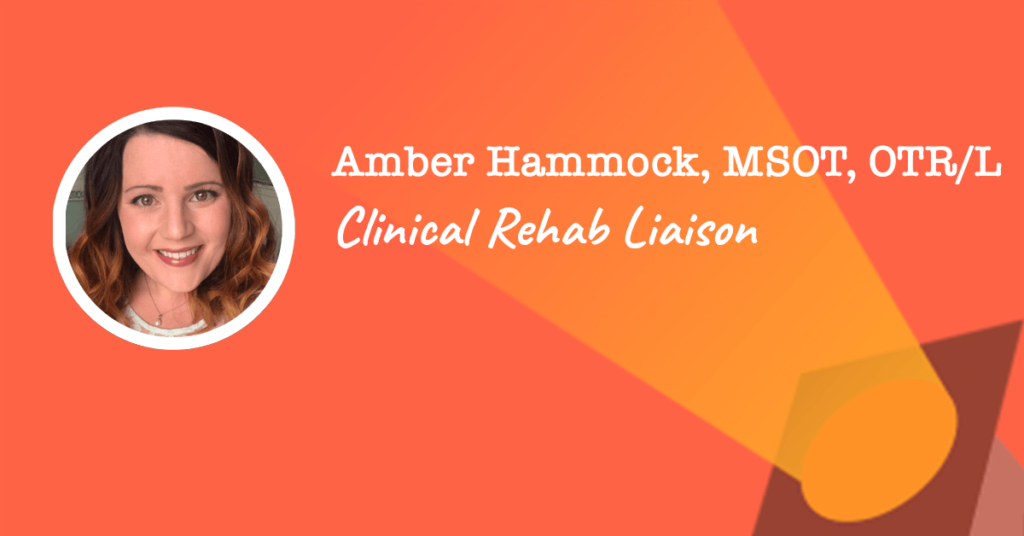Today’s non-clinical spotlight focuses on Amber Hammock, who went from occupational therapist to clinical rehab liaison!
This post may contain affiliate links or codes. This won’t increase your cost, but it helps keep TNCPT alive, and free of annoying ads! Thank you for your support. 🙂
What is your full name and title at your current job?
Amber Hammock, MSOT, OTR/L
Clinical Rehab Liaison at UVA Encompass Health

Where did you go to OT school, and what year did you graduate?
Jefferson College of Health Sciences, Roanoke, VA 2012
What did you do when you first finished school, and for how long?
So, this is how I knew I needed to find a different take on the therapy degree. I worked everywhere and, much like Goldilocks, could not find my “just right.”
I started at a small acute care hospital, where I was split between inpatient and outpatient, peds/adult, and acute/swingbed units. I left there and pursued a small private outpatient pediatric setting that was utterly disgraceful with how they treated their employees. I was only there for about seven months, and then got a job in the school systems.
I was pursuing Public Service Loan Forgiveness, so I worked directly for the county schools. As such, I worked two other PRN jobs to make up for the low pay. One was in an inpatient rehab setting, and the other was another private pediatric outpatient setting.
I really felt terrible in the schools; I was constantly having my professional and clinical judgement questioned, and I never had the time or resources to do what I knew would change the classrooms. This left me feeling like a complete and utter failure.
As miserable as I was, the sweet schedule kept working in schools for about four years before I had to throw in the towel with that setting, too.
When did you realize you wanted to do something non-clinical, and why?
At this point—when I quit the school-based job with the great schedule—I knew it was not the job, it was the career.
I was looking up real estate licenses, certifications, the cost of faking your own death…anything to get me out of a career that had put me $160,000 in debt.
But I knew I couldn’t go back to school. So, I decided to do travel therapy for a bit to pay off some debt, so that I could afford to take a hit financially if I found a non-clinical OT role that didn’t meet my salary as a therapist.
After “trying on” so many settings, I realized my heart wasn’t in patient care. I looked into teaching and sales, but was nervous about both.
During my researching I stumbled upon some Facebook groups, and rehab liaison/clinical liaison positions kept popping up.
Clinical liaison roles seemed like a baby step into sales, and I saw one role that was with a company I had worked PRN at for nearly four years—so it felt a little safer than starting something completely new.
Are you still treating patients, or are you solely non-clinical?
I am completely non-clinical. I do visit with patients at bedside, but only to explain what inpatient rehab is and what it looks like.
And, truth be told, answering patients’ and families’ questions and calming their fears was basically my favorite part of patient care—so, this is a perfect fit for me!
How long have you been in your current role?
About nine months, but I moved from a clinical admissions liaison to a clinical rehab liaison role. The admissions liaison role was more of “air traffic control” at my actual hospital. It involved:
- Starting insurance authorizations
- Checking bed availability
- Monitoring physician caseloads, etc.
The rehab liaison role is more “salesy.” I am working in a different hospital and visiting the referrals to establish that they would benefit from a stay in inpatient rehab, and are also agreeable to come to us.
How did you find your job? Did you apply or find it through a connection?
I found it on Indeed.
I wasn’t actually planning on taking the job; I applied to learn more about what the job entailed, but they offered me the job in the interview and offered me more than I was making when I was working three jobs, so I went with it.

Did you do anything special to your resume and cover letter to land the job?
I tried to highlight skills that would carry over, such as being self-motivated, organized and flexible.
Here are some things I really highlighted:
- Being able to self-manage my schedule when split between multiple buildings/facilities
- My strong communication skills
- My ability to work well on a team
- My efficiency
- Time management skills
What was the interview like for the role?
My interview was fairly casual and conversational however, initially it focused on situational/behavioral questions that are pretty common in most interviews (“Think of a time you had a conflict with a coworker, how did you handle it and how was it resolved?” etc.)
Did you get any special certifications or training along the way to help you get into your current role?
I got some training, but our whole team quit pretty shortly after I started, including my boss that had hired me. This caused quite a wrench to be thrown into the on-boarding process.
As a result, even though I had received training as an admissions liaison, the team felt I would be a better fit as a rehab liaison. Following the promotion, I’ve admittedly gotten pretty sporadic training—but when I have requested more assistance, they have been very supportive.
How did people react to your unconventional career path at first? What about now? If people were negative about your decision, how did you handle it?
I had wanted out of patient care for many months if not years prior to taking this opportunity so my family was extremely supportive. (Especially when they learned that, instead of working three jobs, I could work one—and make more money doing so.)
What’s a typical day or week in the life like for you? What types of tasks and responsibilities fill your time?
I work in our feeder hospital and market for new patient referrals to inpatient rehab.
Marketing involves:
- Education of referral sources (case managers, nurse navigators, physicians) in person
- Presenting to referral sources with inservices, etc.
When I receive a referral, I meet with the patient and do a very basic intake on their baseline, goals, needs, etc., and answer any questions they may have about inpatient rehab, and educate them on what to expect.
After that, I write up a brief summary of their hospital course, prior level of function, current level of function and short statement of why they would benefit from the intensity of inpatient rehab.
I then coordinate with our physicians and the referring case manager to orchestrate the patient’s transition from the acute hospital to our hospital.

What are some of the challenges of your role? What are the rewards?
As with most jobs and especially in a marketing/sales role, numbers matter. Ultimately, you are doing what you can do—but with a corporate structure, they always want more (or better), which can be a little disheartening when you know you’re doing 110%.
But, eventually that rolls off your back because you know you’re doing your best, and every business pushes you to do the best you can.
How do you think working as an OT prepared you for this role? Which skills transferred?
Absolutely; a portion of our job is using our clinical background to determine if a patient is able to meet the demands of three hours of therapy per day—and if that patient truly stands to benefit (with measurable gains) from an inpatient rehab stay.
I also think our backgrounds of educating patients and caregivers aids us in communicating and establishing rapport with referrals and referral sources.
Roughly speaking, how are the hours and pay compared to patient care?
The hours are longer and can be a bit stringent, but the pay is better! And the work is a much better fit for my personality—so, as with most things, it is a give and take.
I feel like my day goes by much faster, and I don’t dread going in every day, so any tradeoff is worth it!
What type of person do you think would do well in your role?
A strong clinical rehab liaison is:
- A people person
- A strong communicator
- Efficient
- Demonstrates good time management
- Autonomous
I say these things because if you don’t get your work done in a timely manner, there will be repercussions, as you will damage relationships with referral sources and physicians—and likely delay a patient’s care.
Do you work remotely or on-site?
I work onsite at the referring hospital, not the hospital I am actually employed with.
Did you read any books or take any courses to get you where you are today?
Nope, just The Non-Clinical PT’s blog post on the position 🙂
What is next for you? What do you want to do with your career long-term?
I would love to work my way up to senior leadership as a marketing director, but I could also see myself pursuing an remote utilization review position in the future if I get worn out with my hour commute…
What would you recommend to someone who is considering going into a role like yours?
If possible, try to learn your market. By that, I mean know what hospitals may be in your territory, and whether they have a relationship with the hospital to which you’re applying.
[Editor’s note: I was a rehab liaison once, and 100% agree with this advice. Knowing your market is key!]
On a personal level, you’ll also want to consider the reputation of the hospital in question—will you feel good asking patients to come to your facility over other options?
What would you like to change most in your profession, and why?
Most of my complaints are very hospital-specific, and are specific to barriers preventing my referrals from coming to inpatient rehab.
Overall, I love the work and I don’t mind it at all.





